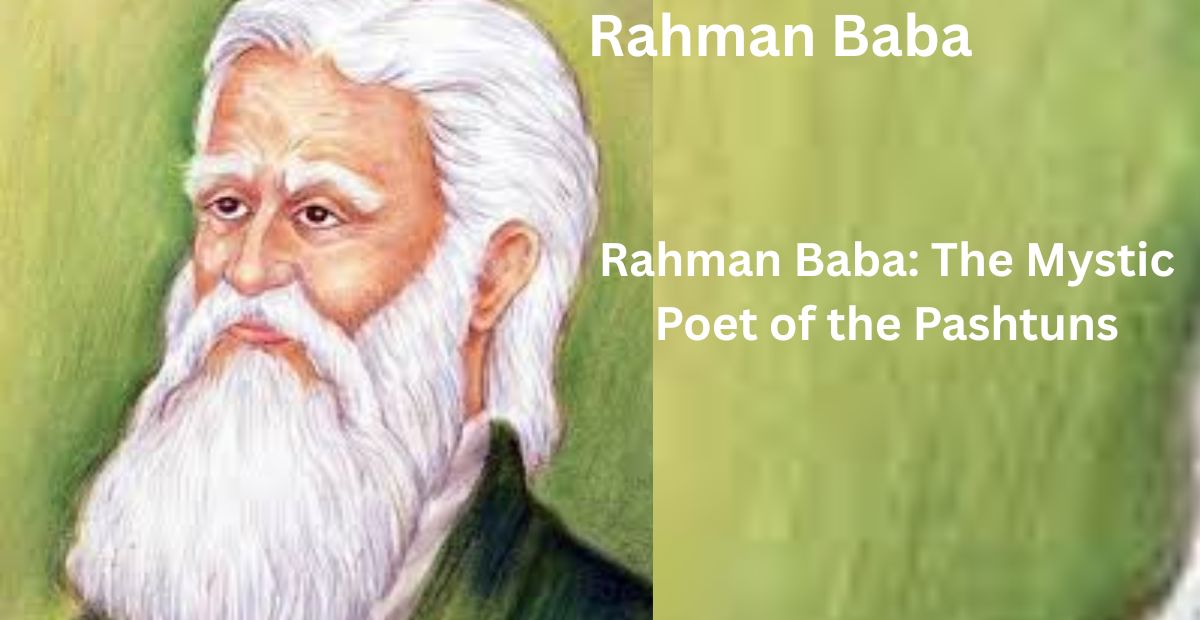Abdur Rahmān Momand (Pashto: عبدالرحمان بابا), more widely revered as Rahman Baba (Pashto: رحمان بابا), was a 17th-century Sufi saint, scholar, and poet whose spiritual and literary legacy remains deeply embedded in Pashtun culture. Born around 1632 CE in Peshawar, then part of the Mughal Empire (in what is now Khyber Pakhtunkhwa, Pakistan), Rahman Baba is celebrated as one of the greatest Pashto poets and a leading voice in Islamic mysticism.
Early Life and Background
Rahman Baba was born into the Momand tribe, specifically a sub-clan of the Ghoryakhel Pashtuns. There remains scholarly debate over the status of his family—some suggest they were local chieftains (Maliks), while others argue he lived a life of humility and asceticism. His own verses hint at a disdain for material wealth, as illustrated in his famous line:
“Though the wealthy drink water from a golden cup, I prefer this clay bowl of mine.”
He led a life removed from the political or tribal conflicts of his time, focusing instead on spiritual reflection and poetic expression.
Spiritual Path and Sufi Affiliation
While Rahman Baba’s poetry is deeply infused with Sufi ideology—centering on divine love, humility, and inner purification—his precise Sufi order is debated among scholars. Some believe he may have had Naqshbandi initiation in Kohat, while others associate him with the Chishti or Qadiri orders. Despite these claims, there is no definitive evidence about his spiritual teacher or formal tariqa, although his writings clearly embody core Sufi values.
Literary Contributions
Rahman Baba’s most enduring work is his Dīwān—a collection of 343 poems written mostly in Pashto. His verse eloquently bridges the worldly with the spiritual, offering profound insights into the Sufi path. His poetry promotes non-violence, introspection, and devotion to God, resonating deeply with the Pashtun ethos.
The Dīwān of Rahman Baba gained wide circulation by the early 18th century, and numerous manuscripts have been preserved in prestigious libraries worldwide, including:
- Pashto Academy, Peshawar
- British Library, London
- Bibliothèque Nationale, Paris
- Bodleian Library, Oxford
- John Rylands Library, Manchester
The first printed version of his Dīwān was compiled by T.P. Hughes, an Anglican missionary, and published in Lahore in 1877. This edition remains widely used today.
Legacy and Influence
To many Pashtuns, Rahman Baba’s poetry holds a status second only to the Qur’an, revered not just for its linguistic beauty but also for its spiritual guidance. He is a central figure in Pashto literature alongside contemporaries like Khushal Khan Khattak. Rahman’s poetry continues to be a source of inspiration, not only for mystics and poets but also for everyday people seeking wisdom and solace.
His shrine, located in Hazar Khwani on the southern outskirts of Peshawar, has become a pilgrimage site. An annual festival, Urs Mubarak, is held every April 4th, attracting devotees from across Pakistan and Afghanistan.
Destruction and Restoration of His Shrine
On March 5, 2009, Rahman Baba’s shrine was attacked by militants, who bombed the complex, damaging the mausoleum, mosque, and nearby facilities. This attack was seen as an assault on Pashtun culture and Sufi heritage. The shrine was fully restored and reopened in November 2012 after a major reconstruction effort costing over Rs. 39 million.
Translations and Global Reach
Efforts have been made to bring Rahman Baba’s works to an international audience. A notable English translation of 111 verses, titled “Rahman Baba: A Few Verses from His Deewan”, was published by Hidayatullah Arbab Mohmand in 2009. Other scholarly translations and studies have been done by Robert Sampson and Momin Khan, helping introduce Rahman Baba’s philosophy to the Western academic world.
Commemorations
Rahman Baba’s influence transcends poetry. A high school named in his honor exists in Kabul, Afghanistan, and his works are studied in various institutions across the region. His legacy is also a symbol of the gentle, spiritual, and intellectual side of Pashtun identity, which often contrasts with stereotypical representations of the region.
Selected Recommended Works
- The Poetry of Rahman Baba: Poet of the Pukhtuns – Robert Sampson & Momin Khan
- Sow Flowers: Selections from Rahman Baba – Interlit Foundation
- The Nightingale of Peshawar – Jens Enevoldsen
- Rahman Baba: A Few Verses – Hidayatullah Mohmand
Conclusion
Rahman Baba remains a towering figure in the cultural, spiritual, and literary landscape of the Pashtun people. His words, filled with love for God, compassion for humanity, and a call for inner purity, continue to resonate with readers centuries after his death. In a world often torn by conflict, his poetry serves as a gentle reminder of peace, humility, and the transformative power of spiritual devotion.
